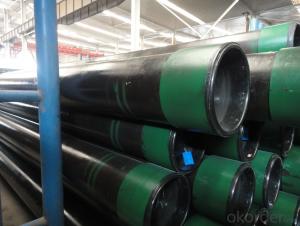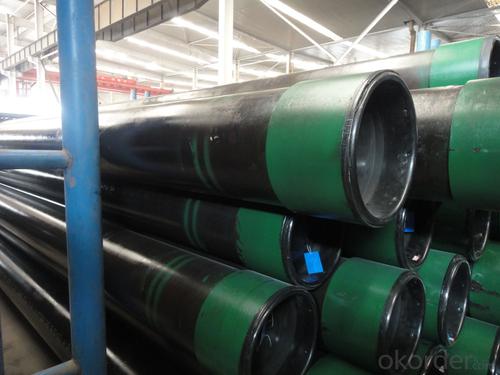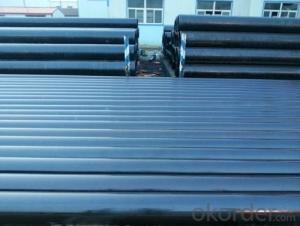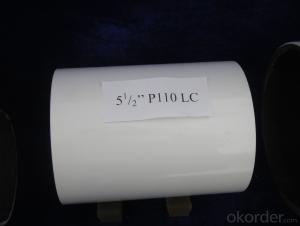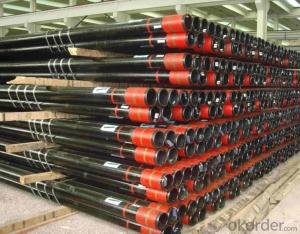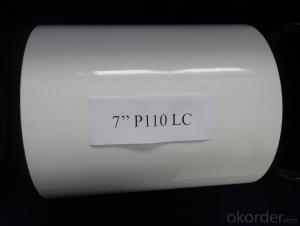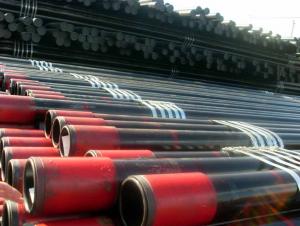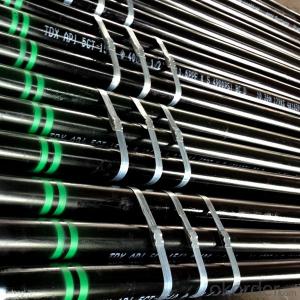API Spec 5CT J55 K55 N80 Casing pipe seamless steel pipe for Use as Oil Casing and Tubing for well
- Loading Port:
- Shanghai
- Payment Terms:
- TT OR LC
- Min Order Qty:
- 10 m.t.
- Supply Capability:
- 100000 m.t./month
OKorder Service Pledge
OKorder Financial Service
You Might Also Like
Type | Casing pipe |
Size | 2-3/8" - 20" |
Wall thickness | 4lb/ft-106.5lb/ft |
Standard | ANSI,ASME GB, SH,HG, MSS,JIS,DIN, API |
Material | J55 K55 N80 L80 P110 etc. |
Packaging | in bundle |
Applications range | petroleum, smelting, foodstuff, power, papermaking, chemical, medical equipment, aviation, boiler heat, exchanger, gas metallurgy, shipbuilding, construction, etc. |
Min Order Quantity | 5 tons |
Delivery Time | 3 working days after received buyer's deposit |
Quality | First grade |
Productivity | 270000tons/year |
Others | 1.Special design available according to requirement 2.anti-corrosion and high-temperature resistant with black painting 3. All the production process are made under the ISO9001:2000 strictly. |
- Q: What is the purpose of a steel pipe coating?
- The objective of applying a coating to a steel pipe is to safeguard it against corrosion and other environmental elements that may cause deterioration. By coating the pipe with a layer of material, a barrier is created between the steel and its surroundings, thereby averting direct contact and reducing the risk of corrosion. This is particularly crucial for pipes utilized in industries such as oil and gas, water distribution, and construction, where they encounter harsh conditions like moisture, chemicals, and extreme temperatures. Moreover, the coating improves the pipe's durability and longevity, guaranteeing its ability to withstand the demands of its intended use. In certain cases, specific types of pipe coatings can also possess insulation properties, which are valuable in applications where precise temperature control is essential to prevent heat loss or transfer. All in all, the primary purpose of a steel pipe coating is to safeguard the pipe, prolong its lifespan, and ensure optimal performance across various industries and environments.
- Q: What is the cost of steel pipes compared to other pipe materials?
- The cost of steel pipes can differ from other pipe materials depending on various factors, such as size, grade, and availability. However, steel pipes typically offer more cost-effectiveness compared to alternative materials. This is due to the widespread availability and versatility of steel, which allows for easy manufacturing and fabrication into different pipe sizes and shapes. When compared to materials like copper, stainless steel, or plastic, steel pipes are often more affordable due to their lower manufacturing costs. Furthermore, steel pipes have a longer lifespan and superior durability, making them a cost-effective choice in the long term. They exhibit resistance to corrosion, can withstand high pressure and temperature, and find applications in plumbing, construction, and infrastructure projects. It is worth mentioning that the cost of steel pipes can still fluctuate based on market conditions, demand, and location. Nevertheless, overall, steel pipes are generally considered a cost-effective option when compared to other pipe materials.
- Q: Are steel pipes resistant to ultraviolet (UV) radiation?
- No, steel pipes are not inherently resistant to ultraviolet (UV) radiation.
- Q: What is the average lifespan of steel pipes?
- The average lifespan of steel pipes varies depending on various factors such as their quality, usage, and maintenance. However, under normal conditions, well-maintained steel pipes can last for several decades or even longer.
- Q: How are steel pipes used in the oil and gas pipeline transportation?
- Steel pipes are widely used in the oil and gas industry for pipeline transportation due to their durability, strength, and resistance to corrosion. These pipes are specifically designed to withstand high pressure and transport various types of fluids, including crude oil, natural gas, and refined petroleum products. In oil and gas pipeline transportation, steel pipes are primarily used for three main purposes: gathering, transmission, and distribution. Gathering pipelines are responsible for collecting oil and gas from the production wells and transporting them to processing facilities. Steel pipes are used in these pipelines due to their ability to withstand the harsh conditions of the extraction sites and effectively transport the fluids over long distances. Transmission pipelines are used to transport oil and gas over vast distances, sometimes spanning across countries or continents. Steel pipes are ideal for this purpose as they can handle high pressure, ensuring the efficient flow of fluids over long distances. These pipes are often buried underground or submerged in water to protect them from external elements and minimize the risk of damage. Distribution pipelines are responsible for delivering oil and gas to end-users, such as homes, businesses, and industrial facilities. Steel pipes are commonly used in these pipelines as they can handle the varying demand and pressure requirements of different consumers. These pipes are often smaller in diameter compared to transmission pipelines but still provide reliable and safe transportation of oil and gas to their final destinations. In addition to their strength and durability, steel pipes used in oil and gas pipeline transportation are also coated or lined with various materials to enhance their resistance to corrosion and minimize the risk of leaks. These protective coatings and linings ensure the longevity of the pipes and maintain the integrity of the transported fluids. Overall, steel pipes play a crucial role in the oil and gas industry by providing a reliable and efficient means of transporting oil and gas from production sites to processing facilities and ultimately to end-users. Their durability, strength, and resistance to corrosion make them an ideal choice for pipeline transportation in this industry.
- Q: Can steel pipes be used for underground fire hydrants?
- Yes, steel pipes can be used for underground fire hydrants. Steel pipes are commonly used in underground water supply systems, including fire hydrant installations. They are known for their durability, strength, and resistance to corrosion, which makes them suitable for underground applications. Additionally, steel pipes can withstand high water pressures and provide a reliable and long-lasting solution for fire hydrant installations. However, it is essential to ensure that the steel pipes used for underground fire hydrants are properly coated or lined to prevent corrosion and maintain their structural integrity over time. Regular maintenance and inspections should also be conducted to identify and address any potential issues that may arise.
- Q: How can steel pipes be protected from corrosion?
- Steel pipes can be protected from corrosion through various methods. One common method is the application of protective coatings. These coatings act as a barrier between the steel and corrosive elements in the environment. The most widely used protective coating for steel pipes is epoxy, which provides excellent resistance to corrosion. Other coatings such as polyethylene and polyurethane can also be used depending on the specific application and requirements. Another effective way to protect steel pipes from corrosion is by cathodic protection. This technique involves the use of sacrificial anodes or impressed current systems to prevent corrosion. Sacrificial anodes, typically made of zinc or aluminum, are attached to the steel pipes. These anodes corrode instead of the steel, sacrificing themselves to protect the pipes. Impressed current systems, on the other hand, use a direct electrical current to counteract the corrosion process. Regular maintenance and inspection are crucial in the protection of steel pipes from corrosion. Monitoring the condition of the coatings, checking for any signs of damage or deterioration, and promptly addressing any issues can help prevent corrosion from occurring or spreading. Additionally, implementing proper drainage systems to avoid the accumulation of moisture around the pipes can further protect them from corrosion. Lastly, environmental factors should be taken into consideration when protecting steel pipes from corrosion. This includes mitigating exposure to corrosive substances, such as acids or chemicals, and ensuring proper ventilation and airflow to prevent the buildup of moisture and humidity. By implementing a combination of these protective measures, steel pipes can have an extended lifespan and maintain their structural integrity.
- Q: How long do steel pipes last?
- The lifespan of steel pipes can vary depending on several factors, including the quality of the steel used, the environment in which they are installed, and the maintenance and care given to them. Generally, steel pipes are known for their durability and longevity. With proper installation and regular maintenance, steel pipes can last for several decades, often exceeding 50 years. However, it is important to note that external factors such as corrosion, exposure to extreme temperatures, and chemical reactions can significantly affect their lifespan. Regular inspections, timely repairs, and protective coatings can help extend the life of steel pipes, ensuring their reliability and functionality for many years.
- Q: What is a flange and how is it used in steel pipes?
- A flange is a mechanical device that is used to connect two sections of steel pipes together. It consists of a flat or raised ring that is attached to the end of each pipe section. The flange provides a surface for the pipes to be bolted or welded together, creating a secure and leak-proof joint. It also allows for easy disassembly and reassembly of the pipes when necessary. Flanges are commonly used in various industries, such as oil and gas, water treatment, and manufacturing, where the connection between steel pipes needs to be strong and reliable.
- Q: Can steel pipes be used for agricultural irrigation?
- Yes, steel pipes can be used for agricultural irrigation. They are durable, resistant to corrosion, and have high tensile strength, making them suitable for transporting water over long distances in agricultural fields. Steel pipes also have the advantage of being able to withstand high pressure, making them ideal for irrigation systems that require efficient water distribution.
Send your message to us
API Spec 5CT J55 K55 N80 Casing pipe seamless steel pipe for Use as Oil Casing and Tubing for well
- Loading Port:
- Shanghai
- Payment Terms:
- TT OR LC
- Min Order Qty:
- 10 m.t.
- Supply Capability:
- 100000 m.t./month
OKorder Service Pledge
OKorder Financial Service
Similar products
Hot products
Hot Searches
Related keywords
